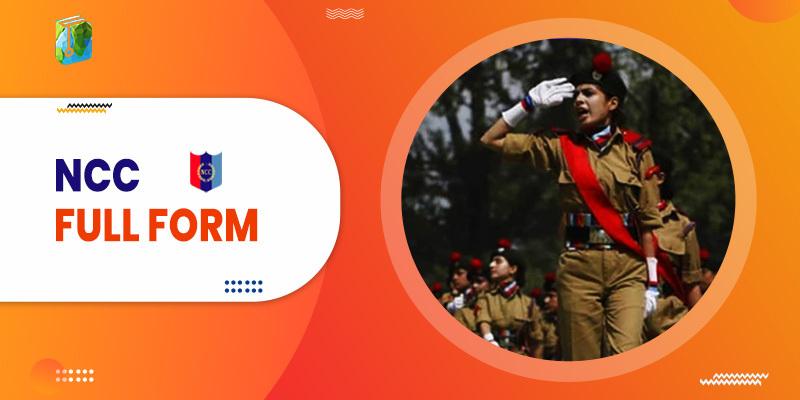The NCC is India’s military cadet corps, which provides students in schools and colleges with basic military training in all three forces: the Indian Army, Indian Navy, and Indian Air Force. The full form of NCC stands for “National Cadet Corps.” The organization’s headquarters are in New Delhi. Lt Gen Rajeev Chopra is the Director-General of the National Cadet Corps as of 2019.
NCC Full-Form | National Cadet Corps
NCC Objective
The purpose of NCC is to create a pool of organized, trained, and motivated youth imbibing leadership qualities, good character, comradeship, and the spirit of adventure amongst young citizens.
NCC Inception
In the year 1946, the Cadet Corps Committee was formed with Pt HN Kunzru as chairman. The Cadet Corps Committee carried out a detailed study of the problems of the youth of India. The bill drafted by the Constituent Assembly regarding the formation of a Cadet Corps, named the “National Cadet Corps”, as recommended by the Kunzuru Committee, was passed in 1948. The NCC was inaugurated on July 15, 1948.
Motto
NCC works to align its motto with its work: “Unity and Discipline” by developing a secular outlook, discipline, and ideals of selfless service amongst young citizens.
Core Values
The activities of the NCC are guided by certain core values that can be witnessed among all ranks of the NCC. These include:
- A feeling of nationalism for a contribution to national development
- Respect for knowledge, wisdom, and the power of ideas, diversity in religion, language, culture, ethnicity, lifestyle, and habitat, and maintaining national unity.
- Abide by the norms and values in the Indian Constitution.
- ability to exercise authority in a just and impartial manner
- Participate actively in community development and social welfare programs.
- Sympathy for the needs of poor and socially disadvantaged fellow citizens.
- Understanding the values of honesty, self-sacrifice, perseverance, and a healthy lifestyle free from unhealthy practices
NCC Flag: In 1951, the NCC flag was introduced. In 1954, the flag was redesigned with three colors depicting the three services of the Corps- red for the Army, deep blue for the Navy, and light blue for the Air Force. The letters NCC in gold in the middle encircled by a wreath of lotus adds to the distinctive identity of the flag.
NCC Song: The official song of NCC is titled “Hum Sab Bhartiya Hain”. This song is sung on all crucial occasions of the NCC.
How to Join NCC
A student can join either the upper wing or the lower wing of the National Cadet Corps (Full Form of NCC). Below are the requirements for enrollment:
Junior Wing:
- Age- Twelve years to Eighteen and a half years
- Duration- 2 years
- Concerned department for Application for enrollment- Headmaster/Principal of the school in the prescribed form.
Senior Wing:
- Age– Up to 26 years
- Duration-3 years
- Concerned department for Application for enrollment -Officer Commanding of the nearest NCC Unit
- Fitness is the topmost criterion to be able to join NCC
- An applicant must be medically fit to join the NCC.
Activities in NCC are categorized as under:-
- Institutional Training
- Camp Training
- Attachment Training (Service Unit)
- Airwing Training
- Naval wing Training
- Social Service and Community Development Activities.
- Youth Exchange Program
- Conduct of Republic Day Camp
- Remount & Veterinary Unit Training
- Conduct Adventure Activities
- Conduct of Certificate Examinations
Apart from being groomed and trained by a tri-service organization, certification by NCC also holds significant significance in the life of a cadet.
NCC offers three types of certificates-
A’ Certificate
Eligibility–
- Attendance – A minimum of 75% of total training sessions (junior wing)
- Must have attended one Annual Training Camp.
NCC Benefits-
- NCC certificate gives you a glance of the Indian army, and it clears your way to get the certificate ‘B’.
- Receive ‘B’ Certificate
NCC Eligibility –
- Attendance -a minimum of 75% of total training sessions for the first and second years (Senior Wing).
- Attendance in one Annual Training Camp.
NCC Benefits-
- It allows enrollment for the “C” certificate from NCC, which is very useful. Trainees also get bonus marks in the department of telecommunication and a few other public sectors
- ‘C’ Certificate
NCC Eligibility–
- Certificate B is required.
- must be in their third year of the senior wing.
- Attendance: a minimum of 75% of the three-year periods.
- You must have attended one ATC and any one of the prescribed activities.
NCC Benefits –
- There are up to 32 seats in every regular Indian Military Academy (IMA) and up to 9 vacancies in the Navy.
- Certified with Grade “A” or “B” allows exemption from the CDS examination conducted by UPSC.
- Advantages from Public Sector Undertakings
- Bonus marks in recruitment by the paramilitary forces, the Indian Air Force, and the Indian Navy for sailors and artificer apprentices.
Conclusion
The National Cadet Corps has shaped the lives of millions of the country’s people. It remains committed to producing disciplined citizens who are capable of taking our nation to greatness. National cadets have proved to be great leaders and work hard to give their all to society.

